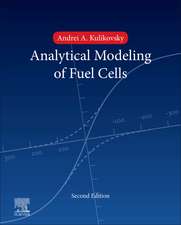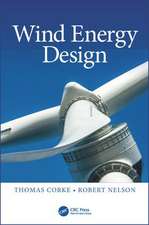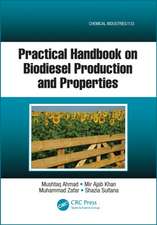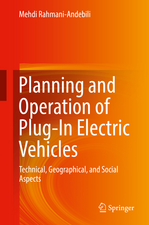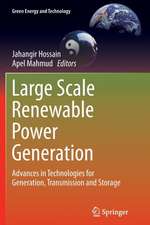Waste-to-Energy: Advanced Cycles and New Design Concepts for Efficient Power Plants
Autor Lisa Branchinien Limba Engleză Hardback – 12 iun 2015
| Toate formatele și edițiile | Preț | Express |
|---|---|---|
| Paperback (1) | 634.00 lei 6-8 săpt. | |
| Springer International Publishing – 9 oct 2016 | 634.00 lei 6-8 săpt. | |
| Hardback (1) | 640.06 lei 6-8 săpt. | |
| Springer International Publishing – 12 iun 2015 | 640.06 lei 6-8 săpt. |
Preț: 640.06 lei
Preț vechi: 753.01 lei
-15% Nou
Puncte Express: 960
Preț estimativ în valută:
122.48€ • 128.20$ • 101.94£
122.48€ • 128.20$ • 101.94£
Carte tipărită la comandă
Livrare economică 31 martie-14 aprilie
Preluare comenzi: 021 569.72.76
Specificații
ISBN-13: 9783319136073
ISBN-10: 3319136070
Pagini: 145
Ilustrații: XVII, 143 p. 89 illus., 77 illus. in color.
Dimensiuni: 155 x 235 x 15 mm
Greutate: 0.41 kg
Ediția:2015
Editura: Springer International Publishing
Colecția Springer
Locul publicării:Cham, Switzerland
ISBN-10: 3319136070
Pagini: 145
Ilustrații: XVII, 143 p. 89 illus., 77 illus. in color.
Dimensiuni: 155 x 235 x 15 mm
Greutate: 0.41 kg
Ediția:2015
Editura: Springer International Publishing
Colecția Springer
Locul publicării:Cham, Switzerland
Public țintă
ResearchCuprins
Introduction.- Municipal Waste Overview.- Waste-To-Energy.- Waste-To-Energy steam cycle.- Waste-To-Energy and Gas Turbine: Hybrid Combined Cycle concept.- WTE-GT steam/water side integration: thermodynamic analysis on one pressure level.- Performance indexes and output allocation for Multi-Fuel energy systems.- Specific application cases with GT commercial units.
Notă biografică
Dr. Lisa Branchini is an Industrial Energy Systems R&D specialist in electricity and heat generation. Her research focus are innovative technologies for biomass & bioenergy systems, and their integration into the grid to improve the overall system efficiency.
Textul de pe ultima copertă
· Explains the basics of Waste-To-Energy (WTE) conversion processes and the technologies currently in use for WTE
· Provides layout and steam cycle adopted parameters for WTE plants
· Examines new and advanced integrated WTE cycles for energy efficiency optimization
· Discusses and identifies several performance indexes and power output allocation approaches for multi-fuel energy systems
This book provides an overview of state-of-the-art technologies for energy conversion from waste, as well as a much-needed guide to new and advanced strategies to increase Waste-to-Energy (WTE) plant efficiency. Beginning with an overview of municipal solid waste production and disposal, basic concepts related to Waste-To-Energy conversion processes are described with reference to combustion grate technologies, highlighting the most relevant aspects impacting the thermodynamic efficiency of WTE power plants. The pervasive influences of main steam cycle parameters and plant configurations on WTE efficiency are detailed and quantified.
Advanced hybrid technology applications, particularly the Hybrid Combined Cycle concept, are examined in detail, including an illuminating compare-and-contrast study of two basic types of hybrid dual-fuel combined cycle arrangements: steam/water side integrated HCC and windbox repowering. Focusing on steam/water side integrated configuration, several layouts are proposed; for each proposed configuration, the optimum plant design is identified to meet the goals of maximizing steam generation and power output, while minimizing discharged outlet temperature. An in-depth case study investigates the strengths and challenges of a medium-sized WTE facility integrated with different market-available gas turbine (GT) units. Finally, the book examines issues of power output allocation and conversion efficiency for a multi-fuel energy system (such as WTE-GT integrated plant), which receives different types of input fuels and generates a single useful output. Several performance indexes and varying power output allocation approaches are identified and compared.
· Provides layout and steam cycle adopted parameters for WTE plants
· Examines new and advanced integrated WTE cycles for energy efficiency optimization
· Discusses and identifies several performance indexes and power output allocation approaches for multi-fuel energy systems
This book provides an overview of state-of-the-art technologies for energy conversion from waste, as well as a much-needed guide to new and advanced strategies to increase Waste-to-Energy (WTE) plant efficiency. Beginning with an overview of municipal solid waste production and disposal, basic concepts related to Waste-To-Energy conversion processes are described with reference to combustion grate technologies, highlighting the most relevant aspects impacting the thermodynamic efficiency of WTE power plants. The pervasive influences of main steam cycle parameters and plant configurations on WTE efficiency are detailed and quantified.
Advanced hybrid technology applications, particularly the Hybrid Combined Cycle concept, are examined in detail, including an illuminating compare-and-contrast study of two basic types of hybrid dual-fuel combined cycle arrangements: steam/water side integrated HCC and windbox repowering. Focusing on steam/water side integrated configuration, several layouts are proposed; for each proposed configuration, the optimum plant design is identified to meet the goals of maximizing steam generation and power output, while minimizing discharged outlet temperature. An in-depth case study investigates the strengths and challenges of a medium-sized WTE facility integrated with different market-available gas turbine (GT) units. Finally, the book examines issues of power output allocation and conversion efficiency for a multi-fuel energy system (such as WTE-GT integrated plant), which receives different types of input fuels and generates a single useful output. Several performance indexes and varying power output allocation approaches are identified and compared.
Caracteristici
Explains the basics of Waste-To-Energy (WTE) conversion processes and the technologies currently in use for WTE Provides layout and steam cycle adopted parameters for WTE plants Examines new and advanced integrated WTE cycles for energy efficiency optimization Includes supplementary material: sn.pub/extras



